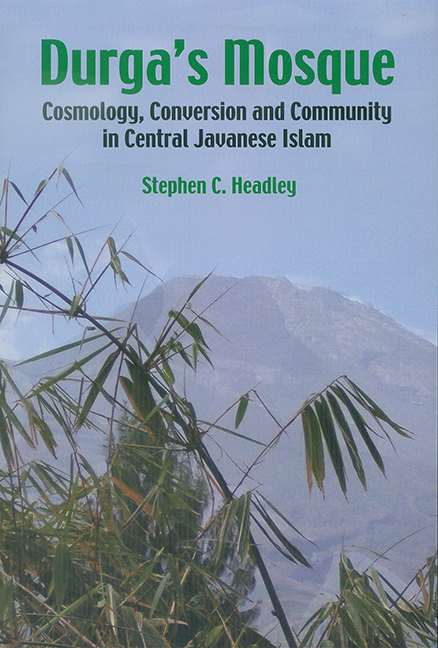Book contents
- Frontmatter
- Contents
- List of Figures
- List of Tables
- Preface
- Acknowledgements
- Introduction: Cosmology, Conversion and Community in Javanese Islam
- PART I THE SOCIOLOGY AND PRACTICE OF RELIGION IN CENTRAL JAVA
- PART II RECONSTRUCTION OF LOCAL RELIGIOUS HISTORY
- 5 Village Muslim Lineages: Local Genealogies in the Forest “Guardian of Death”
- 6 Village Maps for Royal Lineages: Paku Buwana VI in Durga's Forest
- PART III INVOKING THE COSMOS, MAGNIFYING ALLAH: STRUCTURING A LANDSCAPE IN THE SEVENTEENTH TO NINETEENTH CENTURIES
- PART IV COSMOLOGY, CONVERSION AND COMMUNITY IN CENTRAL JAVANESE ISLAM TODAY
- Bibliography
- Index
- About the Author
5 - Village Muslim Lineages: Local Genealogies in the Forest “Guardian of Death”
from PART II - RECONSTRUCTION OF LOCAL RELIGIOUS HISTORY
Published online by Cambridge University Press: 21 October 2015
- Frontmatter
- Contents
- List of Figures
- List of Tables
- Preface
- Acknowledgements
- Introduction: Cosmology, Conversion and Community in Javanese Islam
- PART I THE SOCIOLOGY AND PRACTICE OF RELIGION IN CENTRAL JAVA
- PART II RECONSTRUCTION OF LOCAL RELIGIOUS HISTORY
- 5 Village Muslim Lineages: Local Genealogies in the Forest “Guardian of Death”
- 6 Village Maps for Royal Lineages: Paku Buwana VI in Durga's Forest
- PART III INVOKING THE COSMOS, MAGNIFYING ALLAH: STRUCTURING A LANDSCAPE IN THE SEVENTEENTH TO NINETEENTH CENTURIES
- PART IV COSMOLOGY, CONVERSION AND COMMUNITY IN CENTRAL JAVANESE ISLAM TODAY
- Bibliography
- Index
- About the Author
Summary
THE QUESTION OF THE CONTEXT: JAVANESE AND INDIAN ISLAM
Islamization in Java has been ongoing for some five hundred years and, in other parts of Indonesia, for even longer. Should a historian study this as a process of conversion or as suggested in the Introduction as an acculturation, that is to say, a cultural “adoption” involving both deliberate and involuntary adaptations by successive generations of Muslims?
Given the paucity of data this choice is often not left open. The biographies of individuals converted have usually vanished with the death of those concerned. Furthermore the conversion perspective, whether individual or aggregate, leaves little role for the ethno-historian who seeks to introduce a diachronic dimension. For that it is also useful to look for comparative data from other countries. A brief comparison with the Islamization of India, whose history lasted more than a thousand years, heightens the specific character of Javanese Islam.
Assayag (1995, p. 29) claims that, in India, Muslims generally preferred commerce over proselytism, which pushed them to adopt both local culture and languages. That is equally the case in Java (Pigeaud and de Graaf 1976), where is impossible to consider Islam as a foreign or imported religion, to speak as if the customs and the usages of both Javanese Muslims and non- Muslims were not cut from the same cultural cloth. What explains the lack of similitude between Java and India in this comparison is that the Javanese Hindu-Buddhist tradition disappeared as a state-supported, if not an organized religion in the seventeenth century after the fall of the kingdom of Majapahit (circa AD 1527), while 90 per cent of the Indian population continued in the Hindu tradition. Factors such as nineteenth century Dutch colonial distrust of Islamic movements or in the twentieth century nationalists’ combat against the Darul Islam separatists Muslim movements of the 1950s provoked distinction and isolation that had not existed since the arrival of Islam on the Javanese political scene in the late sixteenth century.
- Type
- Chapter
- Information
- Durga's MosqueCosmology, Conversion and Community in Central Javanese Islam, pp. 197 - 225Publisher: ISEAS–Yusof Ishak InstitutePrint publication year: 2004

